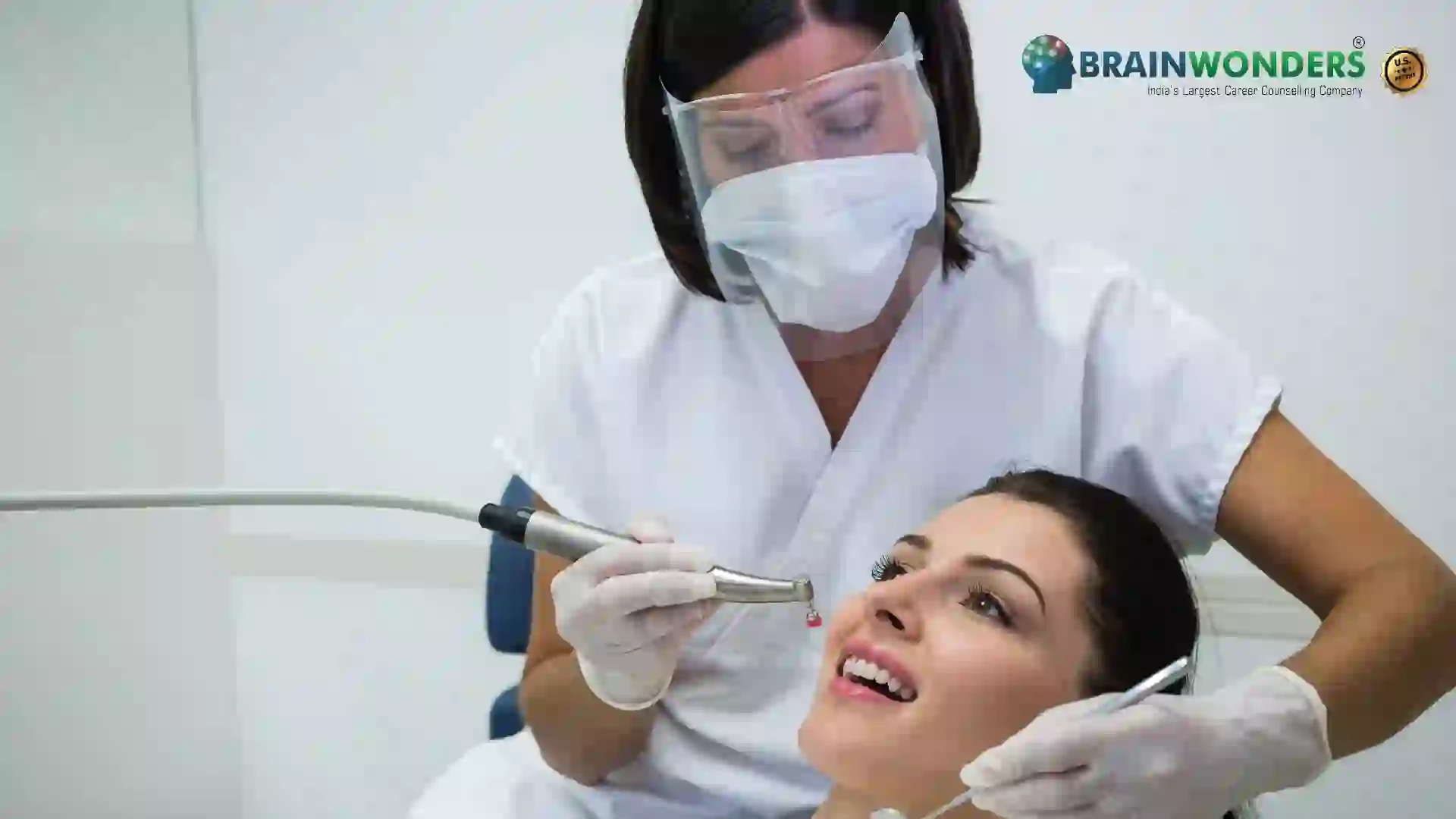How to become a Dental hygienist
Overview, Courses, Exam, Colleges, Pathways, Salary

Overview
Who is Dental hygienist ?
The primary focus of a dental hygienist, who works side by side with a dentist, is the preventative oral healthcare of their patients. A dental hygienist may provide patient evaluations, oral exams, and teeth cleaning and teach patients about the need to maintain excellent oral hygiene at the dentist. Dental hygienists interact with a large number of patients on a daily basis, providing them with primary oral healthcare and educating them on how to maintain their whitest and healthiest smiles. They may be found working in several settings, including regular dentistry offices, hospitals, community clinics, and independent practises. Patients might vary in age from young toddlers to the elderly, and they have a wide range of dental care requirements.
Typical day at work
What does Dental hygienist do?
Job description, Profiles, Roles and Duties:
- Clean teeth and inspect gums of patients
- Gather patient’s medical history
- Evaluate the oral health of patients and report results to dentists
- Record the plans for patient care and treatment
- Inform patients about oral hygiene practices, like brushing and flossing accurately
- Clean and polish teeth to avoid gum disease
- Application of antibacterial treatments to minimalize decay
- Removal of tartar, plaque and stains by utilizing tools like scrapers and polishers
- Application of preventive treatments including fluoride and sealants
- Take and develop mouth X-rays
- Aiding people in getting rid of related issues such as bad breath
- Helping the dentist with activities such as anaesthesia administration and suture removal
- Assist patients in developing and maintaining good oral health
Abilities and Aptitude needed
What are the skills, abilities & aptitude needed to become Dental hygienist?
To succeed as a dental hygienist, you'll need the following abilities: Pay close attention to the details. When it comes to inspecting and treating patients, dental hygienists must adhere to specific guidelines. Whether they're working alone or with a dentist, they'll need to pay attention to and keep track of little things. Ability to communicate Dental hygienists need excellent communication skills to deliver instructions to patients, exchange results with dentists and record patient histories and progress. They must be able to communicate effectively and succinctly in both writing and speaking. Dexterity Dental hygienists need high fine motor abilities since they execute delicate activities in small spaces.
When cleaning and evaluating patients' teeth, these dental experts must be able to work with accuracy and safety. Patience Dental hygienists must be patient in conducting extensive cleanings and exams. They may be required to concentrate for long periods while working in uncomfortable situations. Dental hygienists need good problem-solving skills to establish successful treatment programmes. They perform exams to detect and locate the root of issues, and they use their understanding of oral health to help dentists create hygiene programmes. To do daily responsibilities, dental hygienists use a variety of instruments and technology. Plaque and stains are removed using various instruments, including air-polishing devices and ultrasonic machines. Lasers are becoming increasingly common next to the patient chair as technology advances, and dental hygienists must be educated to utilise them safely. They must be adept in radiography while utilising new types of x-ray equipment.
Dentists and patients must collaborate with dental hygienists. Dental hygienists must discuss the procedures they will use on the patient while also gathering detailed medical information for the dentist. Being a dental hygienist entails educating patients about appropriate oral hygiene, and you should be well-versed in the latest treatments so that you can advise your patients. This is a daily part of the job, whether teaching proper flossing techniques or cleaning braces. Many individuals, especially small children, are uneasy in the dentist's chair. Empathy and the ability to assist people in withdrawing their thoughts from seeking medical assistance may go a long way toward easing anxiety. Some of them are in excruciating pain or are terrified of dental procedures, so the hygienist must be sensitive to their feelings.
Pathways
How to become an Dental hygienist?
Entrance Exam
Entrance Exam for Dental hygienist ?
Courses
Which course I can pursue?
Best Colleges
Which are the best colleges to attend to become an Dental hygienist?
Industries
Which Industries are open for Dental hygienist?
internship
Are there internships available for Dental hygienist?
Career outlook
What does the future look like for Dental hygienist?
Dental hygienists` regular employment includes: Community dental services - ensuring that everyone has access to dental care. The majority of certified dental hygienists work full or part-time in dental offices offering NHS or private treatment to patients. Dental hygienists work as part of many different teams covering all aspects of dental care, from children's dentistry to complex treatments and oral surgery. For example, you could work in hospitals, specialist health centres, and mobile clinics, as well as making home visits or visits to nursing and care homes dental hospitals - dental hygienists work as part of many different teams that cover all aspects of dental care, from children's dentistry to complex treatments and oral surgery.
Defence dental services - at places in the UK or abroad with the British Army, Royal Air Force, and Royal Navy private enterprises in the industry - offering dental treatment to workers. Jobs as a hygienist are available in conventional and specialised dentistry clinics and nursing homes, hospitals, and other healthcare settings. You might also pursue a related field such as orthodontic treatment or health promotion. Several dental hygienists lead oral health educator teams. In a hospital, you'll be caring for patients who have had major surgery, complex orthodontic treatment, or are suffering from other medical ailments. If you have enough experience and can instruct student dental hygienists after additional training, you could be eligible to work in dental practice management. After earning your certification, you'll work as a dental hygienist and get experience in the field. You may work as a dental therapist if you have finished an integrated degree that includes dental hygiene and therapy.
The job market is typically favourable. Oral health and associated health concerns, for example, are becoming more prevalent as the population ages, necessitating the hiring of dental health experts. There are some changes to progress into a dental office management post with expertise. You'll assist the dentist and be in charge of the office's operations in this position. With more skills and training, it may be feasible to transition away from direct patient care and into teaching the next generation of dental hygiene or dental therapy students. There are also research roles available. You might also pursue a career in a related field such as orthodontics, public health, or as a health improvement practitioner.



.webp)


